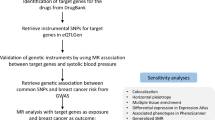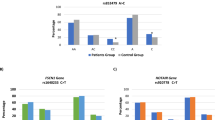Abstract
Purpose
The relationships of genetic variation in the vitamin D pathway with circulating 25-hydroxyvitamin D3 [25(OH)D] levels and survival remain largely unknown for patients with metastatic colorectal cancer (mCRC).
Methods
Among 535 patients participating in a randomized trial of chemotherapy for mCRC, we prospectively measured baseline plasma 25(OH)D and examined 124 tagging single-nucleotide polymorphisms (SNPs) within seven genes in the vitamin D pathway, including five SNPs associated with circulating 25(OH)D levels in previous genome-wide association studies (GWAS). We evaluated whether these SNPs were associated with plasma 25(OH)D levels and patient outcome (overall survival, time to progression, and tumor response), using linear, logistic, and Cox proportional hazards regression.
Results
We observed a significant association between 25(OH)D levels and an additive genetic risk score determined by the five GWAS-identified SNPs (p = 0.0009). We did not observe any direct association between 25(OH)D-associated SNPs, individually or as a genetic risk score, and patient outcome. However, we found a significant interaction between 25(OH)D levels and rs12785878 genotype in DHCR7 on overall survival (pinteraction = 0.02).
Conclusion
Germline genetic variation in the vitamin D pathway informs baseline 25(OH)D levels among patients with mCRC. The association between 25(OH)D levels and overall survival may vary by DHCR7 genotype.
ClinicalTrials.gov Identifier: NCT00003594 (https://clinicaltrials.gov/ct2/show/NCT00003594).

Similar content being viewed by others
References
Meggouh F, Lointier P, Saez S (1991) Sex steroid and 1,25-dihydroxyvitamin D3 receptors in human colorectal adenocarcinoma and normal mucosa. Can Res 51:1227–1233
Vandewalle B, Adenis A, Hornez L, Revillion F, Lefebvre J (1994) 1,25-dihydroxyvitamin D3 receptors in normal and malignant human colorectal tissues. Cancer Lett 86:67–73
Zehnder D, Bland R, Williams MC et al (2001) Extrarenal expression of 25-hydroxyvitamin d(3)-1 alpha-hydroxylase. J Clin Endocrinol Metab 86:888–894
Vandewalle B, Wattez N, Lefebvre J (1995) Effects of vitamin D3 derivatives on growth, differentiation and apoptosis in tumoral colonic HT 29 cells: possible implication of intracellular calcium. Cancer Lett 97:99–106
Diaz GD, Paraskeva C, Thomas MG, Binderup L, Hague A (2000) Apoptosis is induced by the active metabolite of vitamin D3 and its analogue EB1089 in colorectal adenoma and carcinoma cells: possible implications for prevention and therapy. Cancer Res 60:2304–2312
Palmer HG, Gonzalez-Sancho JM, Espada J et al (2001) Vitamin D(3) promotes the differentiation of colon carcinoma cells by the induction of E-cadherin and the inhibition of beta-catenin signaling. J Cell Biol 154:369–387
Scaglione-Sewell BA, Bissonnette M, Skarosi S, Abraham C, Brasitus TA (2000) A vitamin D3 analog induces a G1-phase arrest in CaCo-2 cells by inhibiting cdk2 and cdk6: roles of cyclin E, p21Waf1, and p27Kip1. Endocrinology 141:3931–3939
Iseki K, Tatsuta M, Uehara H et al (1999) Inhibition of angiogenesis as a mechanism for inhibition by 1alpha-hydroxyvitamin D3 and 1,25-dihydroxyvitamin D3 of colon carcinogenesis induced by azoxymethane in Wistar rats. International journal of cancer. J Int Cancer 81:730–733
Fernandez-Garcia NI, Palmer HG, Garcia M et al (2005) 1alpha,25-Dihydroxyvitamin D3 regulates the expression of Id1 and Id2 genes and the angiogenic phenotype of human colon carcinoma cells. Oncogene 24:6533–6544
Evans SR, Shchepotin EI, Young H, Rochon J, Uskokovic M, Shchepotin IB (2000) 1,25-dihydroxyvitamin D3 synthetic analogs inhibit spontaneous metastases in a 1,2-dimethylhydrazine-induced colon carcinogenesis model. Int J Oncol 16:1249–1254
Wjst M, Altmuller J, Braig C, Bahnweg M, Andre E (2007) A genome-wide linkage scan for 25-OH-D(3) and 1,25-(OH)2-D3 serum levels in asthma families. J Steroid Biochem Mol Biol 103:799–802
Orton SM, Morris AP, Herrera BM et al (2008) Evidence for genetic regulation of vitamin D status in twins with multiple sclerosis. Am J Clin Nutr 88:441–447
Shea MK, Benjamin EJ, Dupuis J et al (2009) Genetic and non-genetic correlates of vitamins K and D. Eur J Clin Nutr 63:458–464
Hunter D, De Lange M, Snieder H et al (2001) Genetic contribution to bone metabolism, calcium excretion, and vitamin D and parathyroid hormone regulation. J Bone Miner Res 16:371–378
Ahn J, Yu K, Stolzenberg-Solomon R et al (2010) Genome-wide association study of circulating vitamin D levels. Hum Mol Genet 19:2739–2745
Wang TJ, Zhang F, Richards JB et al (2010) Common genetic determinants of vitamin D insufficiency: a genome-wide association study. Lancet 376:180–188
Ng K, Sargent DJ, Goldberg RM et al (2011) Vitamin D status in patients with stage IV colorectal cancer: findings from Intergroup trial N9741. J Clin Oncol 29:1599–1606
Goldberg RM, Sargent DJ, Morton RF et al (2004) A randomized controlled trial of fluorouracil plus leucovorin, irinotecan, and oxaliplatin combinations in patients with previously untreated metastatic colorectal cancer. J Clin Oncol 22:23–30
Meyerhardt JA, Sloan JA, Sargent DJ et al (2005) Associations between plasma insulin-like growth factor proteins and C-peptide and quality of life in patients with metastatic colorectal cancer. Cancer Epidemiol Biomark Prev 14:1402–1410
McLeod HL, Sargent DJ, Marsh S et al (2010) Pharmacogenetic predictors of adverse events and response to chemotherapy in metastatic colorectal cancer: results from North American Gastrointestinal Intergroup Trial N9741. J Clin Oncol 28:3227–3233
Hutz JE, Manning WA, Province MA, McLeod HL (2011) Genomewide analysis of inherited variation associated with phosphorylation of PI3 K/AKT/mTOR signaling proteins. PLoS ONE 6:e24873
Hollis BW (1997) Quantitation of 25-hydroxyvitamin D and 1,25-dihydroxyvitamin D by radioimmunoassay using radioiodinated tracers. Methods Enzymol 282:174–186
Benjamini Y, Hochberg Y (1995) Controlling the false discovery rate: a practical and powerful approach to multiple testing. J R Stat Soc 57(1):289–300
Cox DR (1992) Regression models and life-tables. In: Kotz S, Johnson NL (eds) Breakthroughs in statistics. Springer, New York, pp 527–541
Gorham ED, Garland CF, Garland FC et al (2007) Optimal vitamin D status for colorectal cancer prevention: a quantitative meta analysis. Am J Prev Med 32:210–216
Ng K, Meyerhardt JA, Wu K et al (2008) Circulating 25-hydroxyvitamin d levels and survival in patients with colorectal cancer. J Clin Oncol 26:2984–2991
Cheng JB, Levine MA, Bell NH, Mangelsdorf DJ, Russell DW (2004) Genetic evidence that the human CYP2R1 enzyme is a key vitamin D 25-hydroxylase. Proc Natl Acad Sci USA 101:7711–7715
Pibiri F, Kittles RA, Sandler RS et al (2014) Genetic variation in vitamin D-related genes and risk of colorectal cancer in African Americans. Cancer Causes Control 25:561–570
Ng K, Venook AP, Sato K et al (2015) Vitamin D status and survival of metastatic colorectal cancer patients: results from CALGB/SWOG 80405 (Alliance). Am Soc Clin Oncol. https://doi.org/10.1200/jco.2015.33.15_suppl.3503
Shabahang M, Buras RR, Davoodi F, Schumaker LM, Nauta RJ, Evans SR (1993) 1,25-Dihydroxyvitamin D3 receptor as a marker of human colon carcinoma cell line differentiation and growth inhibition. Cancer Res 53:3712–3718
Hiraki LT, Major JM, Chen C et al (2013) Exploring the genetic architecture of circulating 25-hydroxyvitamin D. Genet Epidemiol 37:92–98
Morales-Oyarvide V, Meyerhardt JA, Ng K (2016) Vitamin D and physical activity in patients with colorectal cancer: epidemiological evidence and therapeutic implications. Cancer J 22:223–231
Mondul AM, Weinstein SJ, Layne TM, Albanes D (2017) Vitamin D and cancer risk and mortality: state of the science, gaps, and challenges. Epidemiol Rev 39:28–48
Zgaga L, Theodoratou E, Farrington SM et al (2014) Plasma vitamin D concentration influences survival outcome after a diagnosis of colorectal cancer. J Clin Oncol 32:2430–2439
Prabhu AV, Luu W, Sharpe LJ, Brown AJ (2016) Cholesterol-mediated degradation of 7-dehydrocholesterol reductase switches the balance from cholesterol to vitamin D synthesis. J Biol Chem 291:8363–8373
Strawbridge RJ, Deleskog A, McLeod O et al (2014) A serum 25-hydroxyvitamin D concentration-associated genetic variant in DHCR36 interacts with type 2 diabetes status to influence subclinical atherosclerosis (measured by carotid intima-media thickness). Diabetologia 57:1159–1172
Sheehan NA, Didelez V, Burton PR, Tobin MD (2008) Mendelian randomisation and causal inference in observational epidemiology. PLoS Med 5:e177
Jiang X, O’Reilly PF, Aschard H et al (2018) Genome-wide association study in 79,366 European-ancestry individuals informs the genetic architecture of 25-hydroxyvitamin D levels. Nat Commun 9:260
Acknowledgments
Grant support: Research reported in this publication was supported by the National Cancer Institute of the National Institutes of Health under Award Numbers U10CA180821 and U10CA180882 (to the Alliance for Clinical Trials in Oncology), U10CA180790, U10CA180820 (ECOG-ACRIN), U10CA180838, U10CA180867, U10CA180888 (SWOG), and U24CA196171. The content is solely the responsibility of the authors and does not necessarily represent the official views of the National Institutes of Health.
Author information
Authors and Affiliations
Corresponding author
Ethics declarations
Conflict of interest
Charles S. Fuchs declares consulting for Agios, Bain Capital, Bayer, Celgene, Dicerna, Eli Lilly, Entrinsic Health, Five Prime Therapeutics, Genentech, Gilead Sciences, KEW, Merck, Merrimack Pharmaceuticals, Pfizer, Sanofi, Taiho, and Unum Therapeutics. He also serves as a Director for CytomX Therapeutics and owns unexercised stock options for CytomX Therapeutics and Entrinsic Health. Other authors declare that they have no conflict of interest.
Additional information
Publisher's Note
Springer Nature remains neutral with regard to jurisdictional claims in published maps and institutional affiliations.
Electronic supplementary material
Below is the link to the electronic supplementary material.
Rights and permissions
About this article
Cite this article
Yuan, C., Renfro, L., Ambadwar, P.B. et al. Influence of genetic variation in the vitamin D pathway on plasma 25-hydroxyvitamin D3 levels and survival among patients with metastatic colorectal cancer. Cancer Causes Control 30, 757–765 (2019). https://doi.org/10.1007/s10552-019-01183-1
Received:
Accepted:
Published:
Issue Date:
DOI: https://doi.org/10.1007/s10552-019-01183-1




